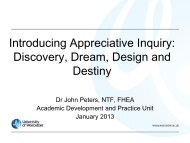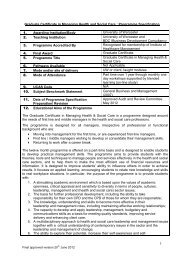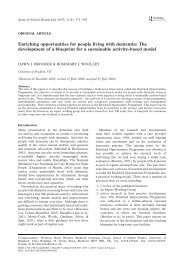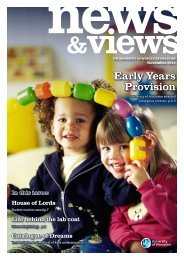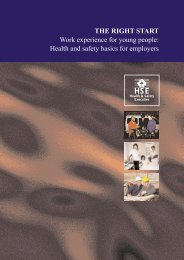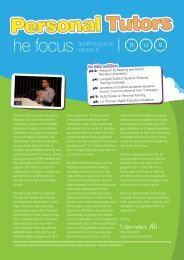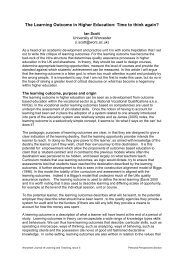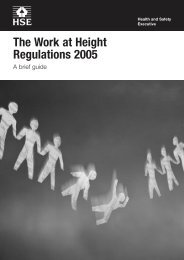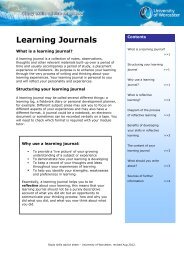Mentoring and Coaching stories - University of Worcester
Mentoring and Coaching stories - University of Worcester
Mentoring and Coaching stories - University of Worcester
You also want an ePaper? Increase the reach of your titles
YUMPU automatically turns print PDFs into web optimized ePapers that Google loves.
In addition, some people favoured the ‘expert’ approach, with ‘words <strong>of</strong> wisdom’ beingmentioned, whereas others suggested a personal development approach with reference to ‘thewhole person’ <strong>and</strong> ‘different perspectives’ This can be accounted for by differing underst<strong>and</strong>ings<strong>of</strong> the terms ‘coaching’ <strong>and</strong> ‘mentoring.’Underst<strong>and</strong>ings <strong>of</strong> friendship included mutual support, shared time, mutual underst<strong>and</strong>ing, <strong>and</strong>honesty <strong>and</strong> commitment.Most felt that the overlapping areas included support, respect <strong>and</strong> interaction. One personbrought up the notion <strong>of</strong> ‘critical friend’ in references to challenge, honesty <strong>and</strong> openness.Differences between the two roles included: power disparities, mutuality (mentoring generallyseen as one way), defined roles in the relationship, organisational restrictions <strong>and</strong> boundaries,<strong>and</strong> references to the degrees <strong>of</strong> choice in the two relationships.Concerns about whether a friend can become a mentor focused around the need for clearboundaries, notions <strong>of</strong> ‘critical friendship’ with some thinking they wouldn’t challenge a friend,<strong>and</strong> mutuality <strong>and</strong> shifts <strong>of</strong> power. The notion <strong>of</strong> prior knowledge was also raised, with thesuggestion that this have both a positive <strong>and</strong> negative impact on a mentoring relationship.It has become apparent throughout this study that people have differing concepts <strong>of</strong> mentoring<strong>and</strong> coaching. Where mentoring is seen as a relationship where an experienced member <strong>of</strong> staff<strong>of</strong>fers a junior or new one direction or support, there is likely to be an unequal powerrelationship <strong>and</strong> a lesser degree <strong>of</strong> mutuality. In this case, friendship may be less likely to existearlier on in the relationship, although it may emerge as the relationship matures. Having saidthis, a client-centred, developmental approach <strong>of</strong> coaching or co-coaching may well becongruent with the role <strong>of</strong> a critical friend. In this case the crucial element is the equal powerrelationship <strong>and</strong> the degree <strong>of</strong> mutuality, where friendship <strong>and</strong> mentoring/coaching may well becompatible. In either case, in order for the relationship to be successful, boundaries need to beagreed, either explicitly or tacitly, <strong>and</strong> rules may need to be renegotiated if the relationshipchanges over time.What makes an effective mentor or coach?Joy Stanton - Senior LecturerJoy’s interest was in finding out different perspectives on what makes an effective mentor <strong>and</strong>coach. This was the research area for her MA dissertation.My purpose was to try to discover more about what makes an effective mentor/coach for traineeteachers in a school setting. In order to do this I focused on both the teachers’ <strong>and</strong> students’view <strong>of</strong> the relationship: what they felt was successful in the relationship <strong>and</strong> what concernedthem.Initially, my research focused on mentors’ <strong>and</strong> students’ views <strong>of</strong> the special attributes <strong>of</strong> asuccessful mentor in school. There was a good deal <strong>of</strong> agreement about these from thestudents <strong>and</strong> mentors, with teachers <strong>and</strong> students valuing good inter-personal skills over <strong>and</strong>above what might be termed pr<strong>of</strong>essional or mentoring skills. Frequently mentioned were skills<strong>and</strong> qualities such as ‘open communication’, ‘listening’, ‘mutual trust’ <strong>and</strong> ‘supportive’. However,the students were also eager for ‘good feedback’ from their mentors <strong>and</strong> wanted their mentorsto be confident practitioners, this was something not mentioned by the teacher mentors. In order<strong>Worcester</strong> Journal <strong>of</strong> Learning <strong>and</strong> Teaching, Issue 6Articles Section



